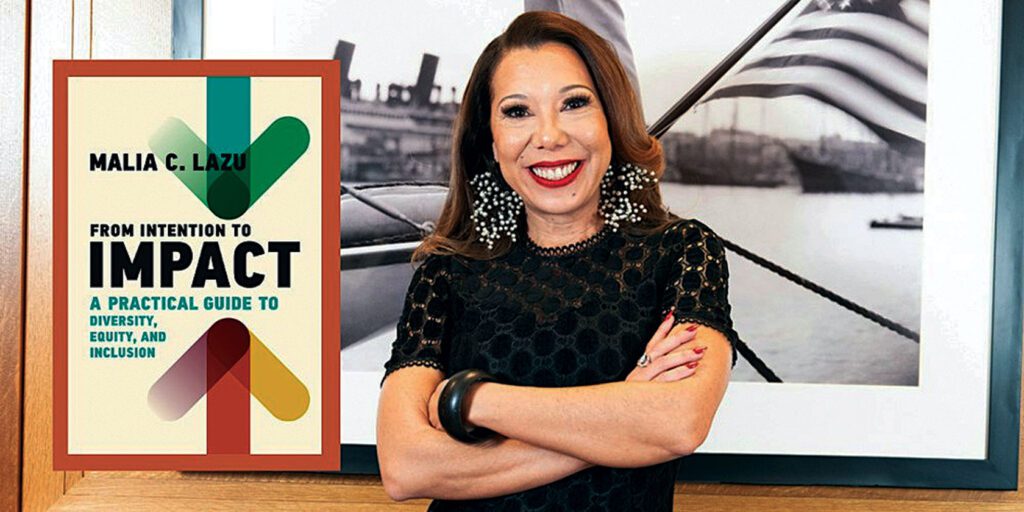
Before moving to Boston, Malia Lazu was an “island girl.” She lived an active life in her hometown of Honolulu, surrounded by politically active adults. She grew up with parents who believed in social justice. Family friends told her about traveling the world. And her dad’s girlfriend gifted Lazu her first Black history book for children.
Lazu’s educational upbringing and multi-heritage identity led her down the path of community organizing. She even worked for singer and activist Harry Belafonte. Now a business consultant and lecturer at the MIT Sloan School of Management, she has taken another step in her vision for equity and justice with her recently published book, “Intention to Impact: A Practical Guide to Diversity, Equity, and Inclusion (Management on the Cutting Edge).”
In 2020, corporations pledged to invest in diversity, equity and inclusion initiatives. Lazu felt that the potential impact of reaching what she calls “true equity” was too ambiguous, along with the reasons behind DEI initiatives. So she set out to provide a roadmap.
“I really wanted to answer this question of, ‘How do we get there?’ So many people talk about DEI in this really aspirational way, but there’s actually steps. There are things that can be done to move the needle,” she said. “And I wanted to be able to create a guide…and show all the different ways that businesses are experimenting with DEI and also really be clear about the why.”
Lazu spent about a year writing, but she said, “Intention to Impact” is a culmination of her 20 years as an organizer and corporate employee, of hours spent “working through white privilege” and working to increase equity in corporate settings.
The book has two sections. In the first, Lazu addresses “how we got here.” She recounts the historical events that led businesses to this moment and breaks down the seven stages from intention to impact.
The second section is a “blueprint for sustainable change.” In it, Lazu provides a guide for practical steps businesses can take towards impact, such as fostering an open work culture and allowing people of color to lead.
Lazu believes diversity in all its forms is beneficial for businesses. “Intention to Impact,” however, focuses on race, which Lazu said people have a harder time discussing compared to, for example, gender or disability. She kept this in mind.
“I worked really hard again to try to write a book that would be open and not get white business leaders defensive, but also be honest and be a book that if a Black person read, they will feel empowered by reading,” she said. “And I’m really proud to say I think I was able to find that balance…there’s some inside jokes there that I think folks will appreciate seeing written in the text.”
Most challenging, she added, was striking a balance between giving businesses credit for their commitment to DEI without overselling their efforts.
Ben & Jerry’s, for example, has been lauded for its pledges and Lazu uses it as a case study in the book. While she said the organization comes close, “there’s no one business that has it all right.”
A key component of DEI is decentralization. It’s the idea that “you replace authority with trust, and you ask everyone to get involved in solving the problem,” Lazu said. Typically, business decisions are made top-down, within the confines of corporate hierarchies.
“That’s not how liberation works. That’s not how equity works,” she said. Decentralization hinges on working with people who are motivated to see DEI in their companies and empowering them to take the desired action and “change organizational culture.”
While writing the book, Lazu relied on ritual. She said she took time off to write parts of it surrounded by the beauty of Hawaii. She took Fridays off to write in the “she-shed” in her Roxbury yard, with bird song but no distractions from her work. From her efforts came a book that offers businesses tangible steps toward DEI practices in the workplace.
Lazu dedicated “Intention to Impact” to “all those — past, present, and future — who are dedicated to expanding justice, everywhere.”
“We so often forget the foot soldiers that do the work. We forget that you would not know Martin Luther King’s name if it wasn’t for Ella Baker, if it wasn’t for Fannie Lou Hamer, if it wasn’t for Byard Rustin,” she said. “And there’s the organizers that were able to be a part of large movements…but there’s also people who just do it every day in small ways.”






